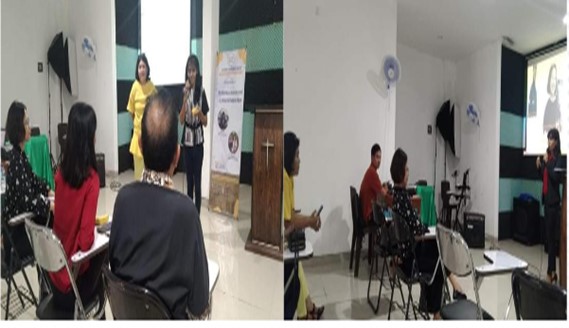PELATIHAN PERSONAL BRANDING AND COMMUNICATION UNTUK MENINGKATKAN PERCAYA DIRI MAHASISWA SEMESTER AKHIR DI STAK ANAK BANGSA
DOI:
https://doi.org/10.47457/jps.v4i3.431Keywords:
communication, confidence, personal branding, student trainingAbstract
In the development of this increasingly fast and sophisticated world, many people compete to equip themselves with various skills, one of which is branding themselves and improving how to communicate effectively and efficiently or on target. Good communication can improve skills, influence the interlocutor and even increase self-confidence. The Community Service (PkM) method is descriptive qualitative with a literature study approach to strengthen this writing. The results obtained from personal branding and communication training for students at Sekolah Tinggi Agama Kristen Anak Bangsa are: Students respond as a whole that the importance of building personal branding and training communication from now on, in addition to increasing self-confidence the training is a provision for students to face community conditions/sites that later they become stakeholders so that student knowledge increases, which needs to be done 1) Students need to find out what abilities they have, 2) Ensure students want to be widely known as what, 3) Do it with everything consistently, which means keep training him.
Downloads
References
Abdhul, Yusuf. 2023. “Studi Pustaka: Pengertian, Tujuan, Sumber Dan Metode.” 10 Mei. https://deepublishstore.com/blog/studi-pustaka/ (July 28, 2023).
Anna Gustina Zainal. 2022. Public Speaking Cerdas Saat Berbicara Di Depan Umum. Probolinggo: Cv. Eureka Media Aksara.
Caesaria, Sandra Desi. 2022. “80 Persen Mahasiswa Bekerja Tidak Sesuai Jurusan, Ini 4 Alasannya.” 7 Nomember. https://www.kompas.com/edu/read/2022/11/07/090548371/80-persen-mahasiswa-bekerja-tidak-sesuai-jurusan-ini-4-alasannya?page=all (July 27, 2023).
Fatmawati, Nurul. 2021. “Berkomunikasi Secara Efektif, Ciri Pribadi Yang Berintegritas Dan Penuh Semangat.” 25 Juni. https://www.djkn.kemenkeu.go.id/kpknl-semarang/baca-artikel/13988/Berkomunikasi-Secara-Efektif-Ciri-Pribadi-yang-Berintegritas-Dan-Penuh-Semangat.html.
Gufron, Nur, and Rini Risnawita. 2019. “Kepercayaan Diri.” Jurnal Penelitian Pendidikan 5(1): 1689–99.
Hadi, Sutrisno. 2002. Metodelogi Research. Yogyakarta: Andi Offset.
Haroen, Dewi. 2014. PERSONAL BRANDING. ed. An dan Andaru Wiranata Ubaedy. Jakarta: Gramedia Pustaka Utama. https://books.google.co.id/books?hl=id&lr=&id=iKBLDwAAQBAJ&oi=fnd&pg=PP1&dq=ahli+pakar+mengenai+personal+branding+dan+komunikasi&ots=tAl9d4H15-&sig=Z2s8qFMJ7z8dje3sQNKyVH-uVTw&redir_esc=y#v=onepage&q&f=false.
Kasih, Ayunda Pininta. 2022. “Bagaimana Cara Membangun Personal Branding?” 23 Juni. https://www.kompas.com/edu/read/2022/06/23/130947971/bagaimana-cara-membangun-personal-branding-daftar-webinar-kompascom-x-tbi.
KBBI. 2006. Kamus Besar Bahasa Indonesia Edisi Kelima. Jakarta: Kemendikbud.
Khamndiniyati, Nurul. 2019. “Hubungan Konflik Peran Ganda Dan Tipe Kepribadian DISC Terhadap Sindrom Kelelahan (Burnout).” Psikoborneo: Jurnal Ilmiah Psikologi 7(1): 47–56.
Knowles, Malcolm S, Elwood F Holon Iii, and Richard A Swanson. “Teori The Adulst Learning.” Academia.Edu. https://www.academia.edu/download/65571919/RANGKUMAN_PERSENTASI_BUKU_MALCOLM.S_KNOWLES.pdf.
Michael R. Hunter. “5 Strategies to Differentiate Your Personal Brand.” https://personalbrand.com/differentiate-your-personal-brand/ (May 13, 2023).
Nita dkk. 2023. Pentingnya Ilmu Komunikasi Pada Era 4.0. ed. Ageng Dzakwan Tubba. Bengkulu: CV. Sinar Jaya Berseri. https://www.google.co.id/books/edition/Pentingnya_Ilmu_Komunikasi_Pada_Era_4_0/GS2oEAAAQBAJ?hl=id&gbpv=1.
Pohan, Desi Damayani, and Ulfi Sayyidatul Fitria. 2021. “Jenis Jenis Komunikasi.” Journal Educational Research and Social Studies 2: hal. 31.
Prastyawan, Agus dkk. 2020. Pengambilan Keputusan. Surabaya: Unesa Press.
Putri, Vanya Karunia Mulia. 2021. “Personal Branding: Definisi, Tujuan, Dan Strateginya.” 5 Agustus. https://www.kompas.com/skola/read/2021/08/05/153000369/personal-branding-definisi-tujuan-dan-strateginya.
Raharjo, Farco Siswiyanto. 2019. The Master Book of Personal Branding. Jogjakarta: Anak Hebat Indonesia. https://www.google.co.id/books/edition/The_Master_Book_of_Personal_Branding/Sh7zDwAAQBAJ?hl=id&gbpv=0&kptab=overview.
Sadya, Sarnita. 2023. “Jumlah Guru Di Indonesia Meningkat Pada 2022/2023.” 3 Mei. https://dataindonesia.id/ragam/detail/jumlah-guru-di-indonesia-meningkat-pada-20222023 (July 1, 2023).
Sanusi, Anwar. 2012. Metodologi Penelitian Bisnis. II. Bandung: Salemba Empat.
Tafonao, Vinsensia Nitamawar, and Dyulius Thomas Bilo. 2023. “BIMBINGANBELAJARSUKARELABAGISISWAKURANGMAMPUDIDESASELUANGKELURAHANMAYASOPA.”
“Tafsiran Amsal 16:4.” In Literatur.
Tamimy, Muhamad Fadhol. 2017. Sharing-Mu, Personal Branding-Mu. ed. Lis Sutinah. Jakarta: Visi Media. https://books.google.co.id/books?id=6Z0sDwAAQBAJ&dq=ahli+pakar+mengenai+personal+branding+dan+komunikasi&lr=&hl=id&source=gbs_navlinks_s.
Yudi Rahmatullah. 2021. “The Naked Traveler, Buku Referensi Untuk Para Travel Blogger.” 13 Juli 2021. https://yoursay.suara.com/ulasan/2021/07/13/100911/the-naked-traveler-buku-referensi-untuk-para-travel-blogger (July 25, 2023).
Zainal, Anna Gustina. 2022. Public Speaking Cerdas Saat Berbicara Di Depan Umum. Probolinggo: Cv. Eureka Media Aksara.

Downloads
Published
How to Cite
Issue
Section
License
Copyright (c) 2023 Jurnal PKM Setiadharma

This work is licensed under a Creative Commons Attribution-ShareAlike 4.0 International License.
Authors who publish with this journal agree to the following terms:
- Authors retain copyright and grant the journal right of first publication with the work simultaneously licensed under a Creative Commons Attribution License that allows others to share the work with an acknowledgement of the work's authorship and initial publication in this journal.
- Authors are able to enter into separate, additional contractual arrangements for the non-exclusive distribution of the journal's published version of the work (e.g., post it to an institutional repository or publish it in a book), with an acknowledgement of its initial publication in this journal.
- Authors are permitted and encouraged to post their work online (e.g., in institutional repositories or on their website) prior to and during the submission process, as it can lead to productive exchanges, as well as earlier and greater citation of published work (See The Effect of Open Access).











